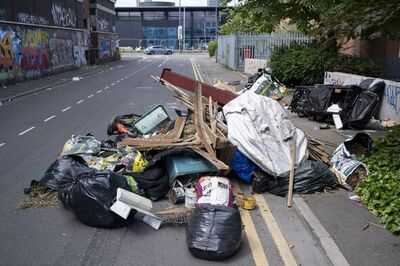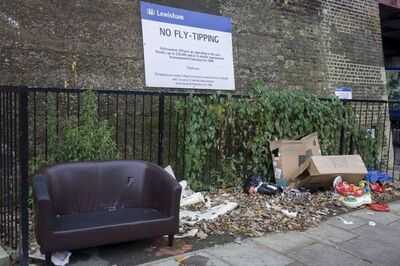
The UK seems to have a fly-tipping problem, with over 2.7 million incidents reported in the past year alone.
This represents a staggering 145% increase from the previous year (1.1 million), as piles of unlawfully discarded waste continue to mar communities across the country.
Piles of rubbish clogging up areas that have no business being used as a waste disposal site are a common visual across the nation these days.
Now, as Halloween approaches, the UK's fly-tipping crisis is taking on a dangerous dimension as recent reports have pinpointed rubbish as a prime target for arsonists. In fact, earlier statements indicate a 40% higher occurrence of such fires on Halloween compared to surrounding days.
So, which UK communities should be most worried this Halloween? To answer this, experts at garage clearance company Rainbow Rubbish Removals identified the UK areas struggling most with fly-tipping, ranking local authorities based on the severity of their littering crisis.
Lewisham holds the undesirable top spot, with illegal dumping occurring at more than double the national average. Vehicle parts, old electrical items and single black bags are among the most frequently discarded items.
Over 11,600 incidents were recorded last year, enough rubbish to cover dozens of football pitches. However, despite the magnitude of the problem, fines totalled just £11,606, or five pence per resident, raising questions about the effectiveness of deterrent measures.
Newcastle-upon-Tyne - 9.26/10The streets of Newcastle are littered with black bags, household waste and white goods, leading to its ranking in the top ten for total fines issued, a whopping £21,771 in the past year. This is nearly double the total of Lewisham, despite having around 30% fewer incidents.
However, at just 11p per resident, it's a modest penalty when compared to the resources needed to clear more than 8,000 recorded cases.
Westminster - 8.59/10If the ranking were based solely on land type incidents, Westminster would take the top spot, with an astonishing 2,710 per 10,000 residents, more than double Lewisham's figure. Despite over a staggering 11 thousand cases of households leaving black bins in the streets, the council issued a mere £675 in fines, less than a penny per person. This makes Westminster not only one of the dirtiest but also one of the most lenient in the top 10.
 Peterborough - 8.46/10
Peterborough - 8.46/10 Peterborough's numbers fall below those of the London boroughs, with 620 waste incidents per 10,000 residents - yet land-type incidents still climbed to 1,240 per 10,000. With total fines amounting to just £4,884, it's evident the city continues to struggle, proving that fly-tipping isn't solely an issue for big cities.
Newham - 8.28/10East London's Newham recorded 926 waste incidents and 1,852 across all land types, yet issued just £924 in fines - less than Hammersmith and Fulham or Brent, which report similar dumping levels. The figures point to uneven enforcement even within London.
Five of the top ten areas most plagued by fly-tipping are London boroughs, suggesting that high population density not only increases the number of people but also seems to amplify rubbish. However, cities outside London such as Newcastle and Peterborough underline that fly-tipping is a nationwide problem, not just confined to the capital.
On the other end of the scale, Chesterfield holds the title for the least amount of fly-tipping, with merely 460 waste incidents and 920 land-type incidents per 10,000 residents. No fines were handed out, but with such infrequent dumping, the council has less to monitor.
When compared to hotspots like Lewisham or Westminster, Chesterfield demonstrates that low population density and strong community responsibility can make a significant difference in maintaining clean towns.
Miroslav Radov, waste expert at garage clearance company Rainbow Rubbish Removals, says: "Fly-tipping isn't just an ugly blot on the landscape, it's an environmental time bomb, and an immediate threat to communities, especially with the increase in arson attacks targeting waste, paired with almost double the fly-tipping reports compared to last year. Solving this crisis means more than just sweeping up the mess; it calls for harsher penalties that bite, more accessible waste-disposal options, and a cultural shift in which people take real responsibility for the rubbish they create."
He further warns: "What's contributing to the problem is how many people unknowingly use unlicensed waste removal services. Something many don't realise is just because you paid someone to take your rubbish doesn't absolve you of responsibility. If it ends up fly-tipped, you face penalties, including fines of up to £50,000 or even prosecution. Always check for licensed waste carriers and get proper documentation. Don't let a cheap quote cost you thousands."
You may also like

Delhi: NDMC's concert in Nehru Park mesmerises music lovers

Pak Defence Minister warns of 'open war' with Afghanistan if ongoing peace dialogue fails

AUS vs IND 2025: Shubman Gill highlights Harshit Rana's value to ODI side

The abandoned town frozen in time as residents were forced to flee by mistake

What Alejandro Garnacho did moments after first Chelsea goal says it all about ex-Man Utd star






